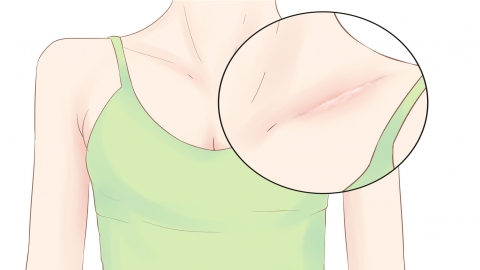What should I do if my surgical scar itches?
Generally, itching at a surgical scar may be related to normal reactions during the wound healing process, dry skin, wound infection, scar hypertrophy, or neurodermatitis. It is recommended to seek timely medical advice and undergo general treatments or medication under a doctor's guidance. The specific analysis is as follows:

1. Normal reaction during the wound healing process
During the healing of a surgical wound, new nerve endings and blood vessels grow into the scar tissue. These newly formed nerve endings are more sensitive to stimuli, making them prone to causing itching. It is recommended to keep the wound clean and dry, avoiding excessive friction or scratching to reduce irritation to the scar tissue.
2. Dry skin
After surgery, the skin barrier function at the wound site may be compromised, leading to moisture loss and dry skin, which can cause itching. It is recommended to use a gentle moisturizing cream or lotion on the skin around the wound to maintain skin hydration and help relieve itching.
3. Wound infection
Wound infections are usually caused by microorganisms such as bacteria or viruses entering the wound. The infection leads to localized inflammation, which stimulates nerve endings and causes itching. Symptoms often include redness, swelling, pain, and discharge. Follow your doctor's instructions to use medications such as Amoxicillin capsules, Cefixime dispersible tablets, or Roxithromycin capsules for treatment.
4. Scar hypertrophy
Scar hypertrophy is typically caused by excessive proliferation of fibrous connective tissue. During wound healing, fibroblasts proliferate excessively, forming scar tissue. Symptoms generally include raised scars, redness, and firm texture. Follow your doctor's instructions to use medications such as Asiaticoside cream, Heparin sodium cream, or Compound Acetate Dexamethasone cream for treatment.
5. Neurodermatitis
Neurodermatitis is usually triggered by psychological factors such as anxiety or stress. Inflammation increases the sensitivity of skin nerve endings, causing itching. Symptoms may also include lichenification of the skin and pigmentation. Under a doctor's recommendation, medications such as Loratadine tablets, Cetirizine hydrochloride tablets, or Ebastine capsules can be used for treatment.
In daily life, it is important to keep the skin moisturized, regularly clean the wound, avoid excessive friction or scratching at the wound site, and minimize irritation to the scar tissue.









